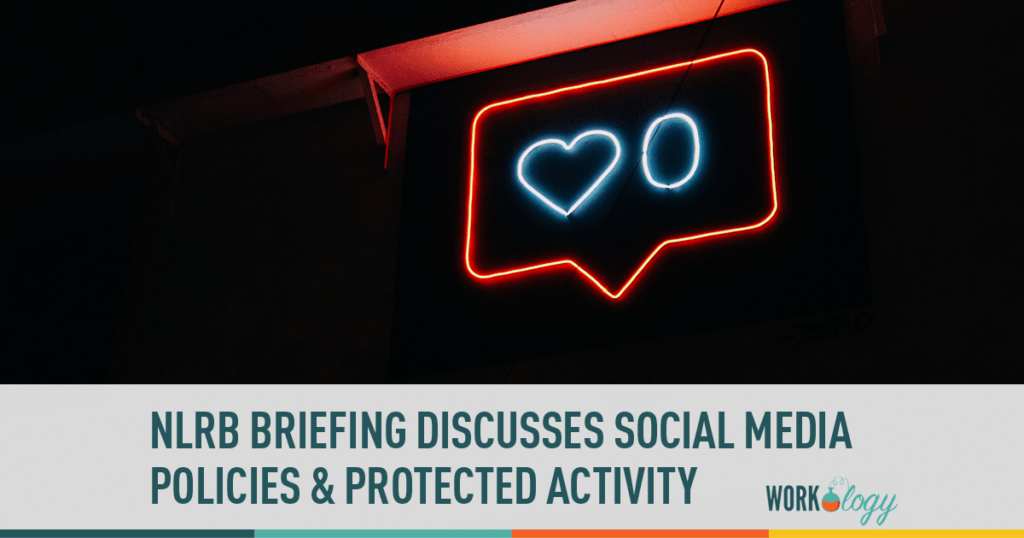**January 25th, 2012 UPDATE. While the information below is still important, the NLRB provided more insights into social media policies. You can download the second report here.
- Employer policies should not be so sweeping that they prohibit the kinds of activity protected by federal labor law, such as the discussion of wages or working conditions among employees.
- An employee’s comments on social media are generally not protected if they are mere gripes not made in relation to group activity among employees.
Late last week, the NLRB (National Labor Relations Board) issued to the public their report from General Council, Lafe E. Solomon regarding their social media and corporate cases the NLRB has been involved in over the course of the last year. The 24 page document provides insights into some of the core areas that the National Labor Relations Board is exploring when it comes to social media at work.
The briefing which for those who are not familiar with the employment law and legal process is filled with legal speak and references to previous cases and is standard for legal briefs. It is not exactly light afternoon reading.
NLRB Briefing Discusses Social Media Policies & Protected Activity
Upon dissecting the document, one of the NLRB’s areas of contention is known as “concerted protected activity.” Concerted protected activity is an activity among all employees of an organization that allows them to speak freely and openly among coworkers and leaders when it involves the topics of compensation, management, and conditions of employment. According to the briefing, concerted activity must be engaged in with or on the authority of other employees, and not solely by and on behalf of the employee himself. It also includes circumstances where individual employees seek to initiate or to induce or to prepare for group action. The NLRB’s job is to evaluate cases when violations of things like concerted protected activity take place in the workplace. These violations are investigated and are called Unfair Labor Practices or ULP’s. These ULP’s can be committed by organizations who are non-union, union represented companies, or the labor unions themselves.
The NRLB have received a great deal of press for their investigation and involvement in the Facebook Firing case. When it comes to social media, not only is your social media policy extremely important but is so is allowing for concerted protected activities to happen on social media sites like (but not limited to) Facebook.
- Comments and posts about supervisors or managers on social media sites could be protected.
- Discussions regarding food, building temperature and office accommodations might be protected.
- Posts that discuss dissatisfaction or publicly question monetary raises or even promotions by employees are generally protected.
- Conversations that involve multiple employees past or present including Facebook “likes” are likely protected.
- Conversations about tax withholdings posted on social media sites are considered “concerted protected activity.”
- Employees can be terminated for derogatory comments that damage a company’s reputation from social media accounts including Twitter and Facebook. These are not protected.
- While not a recommended management practice, firing someone via a private Facebook message is not against the law.
A great deal of the briefing discusses social media policies and their role in both helping and hurting the organization. Several cases mentioned throughout the briefing discussed social media policies that were too broad and attempted to limit employees from posting on social networks during off-work hours without providing specific topics or examples of what was prohibited per the company’s policy. Other social media policy examples mentioned were at the other end of the spectrum and once again limited employees from posting information altogether, thus, violating their concerted protected activity.
I’ve written in length about social media policies and recommended that companies keep their statements as broad as possible, but it’s a balance. While I don’t recommend naming specific sites because it severely limits an organization, it’s also important to consider that a social media policy that is too broad is a fine line.
The NLRB warns that including social media as part of your blanket policy statement regarding employees and communication with media, can violate their protected rights. Since the definition of media can be interpreted many different ways, companies will need to provide more specific information to include or exclude non-traditional media forms like social media as well as blogging from their policies.
Interestingly enough, prohibiting cameras on company premises by employees is acceptable by the organization. I, however, do not believe that restricting cameras is something that is accomplished consistently at most organizations when you consider the high percentage of mobile and smart phone devices that have both camera and video capabilities.
Social media is still a new frontier when it comes to employers. While the NLBR has made efforts to help define employee’s as well as employer’s rights, there is much case law and court decisions left to be written. It’s an ever-evolving piece of the legal landscape.










One Comment
Interesting! Thanks for sharing.
Comments are closed.